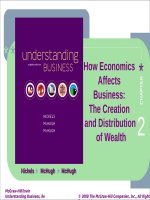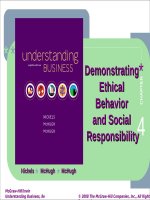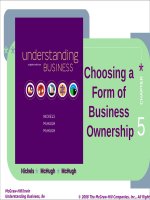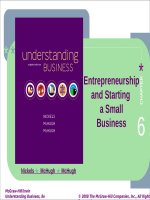Understanding business 11th by mchugh nickels CHAPTER 6
Bạn đang xem bản rút gọn của tài liệu. Xem và tải ngay bản đầy đủ của tài liệu tại đây (1.12 MB, 56 trang )
CHAPTER 6
Entrepreneurship
and
Starting a
Small Business
McGraw-Hill/Irwin
Copyright © 2015 by the McGraw-Hill Companies, Inc. All rights reserved.
NAME that COMPANY
While I was an employee at a big company, I
developed a product that has become a staple
on most office supply lists. I needed something
to mark the pages of a hymnal without falling out
or damaging the book. What started as a simple,
yellow piece of paper with a new adhesive
evolved into many different versions – now there
are Super Sticky, recycled, Pop-Up and
electronic versions of my inventions.
Who am I, who did I work for, and what did I invent?
6-2
WHAT is ENTREPRENEURSHIP?
• Entrepreneurship -Accepting the risk of starting
and running a business.
6-3
NOTABLE ENTREPRENEURS
• French immigrant Élruthère Irènèe du Pont de
Nemours started Du Pont in 1802.
• David McConnell borrowed $500 from a friend to
start Avon.
• George Eastman started Kodak with a $3,000
investment in 1880.
• Jeff Bezos started Amazon.com with investments
from his family and friends.
6-4
ANNE BEILER
Auntie Anne’s
• Started selling pretzels when
her family was living paycheck
to paycheck.
• Now Auntie Anne’s has over
1,200 locations and brings in
over $410 million!
• Beiler sold the company in
2005 to start focusing on
charity work.
5-5
YOU’RE NEVER TOO YOUNG
to be an ENTREPRENEUR
Four reasons to start your business right away:
1. You don’t have a mortgage or kids to take care of.
2. You can survive on little funds and work long hours.
3. No disruption to your career path. It hasn’t started yet!
4. Use your alma mater for resources.
Source: Entrepreneur, www.entrepreneur.com, accessed November 2014.
6-6
YOU’RE NEVER TOO OLD to be
an ENTREPRENEUR EITHER!
• The highest rate of
entrepreneurship activity is in
the 55-64 age group!
• Since 1996, older Americans
have opened businesses at
a higher rate than 20-34 year
olds.
• Older entrepreneurs have
greater experience and more
financial resources.
Source: U.S. News and World Report, www.usnews.com, accessed October 2014.
6-7
WHY TAKE the RISK?
• Opportunity
• Profit
• Independence
• Challenge
6-8
BIG TIME PROFIT
• Michael Dell could buy 1,100
new laptops for every
student at the University of
Texas at Austin!
• Dietrich Mateschitz could
buy himself a can of Red Bull
every day for the next 11
million years!
• Liliane Bettencourt could buy
a box of L’Oreal hair color for
every woman in the world!
Source: Forbes, www.forbes.com, accessed November 2014.
Photo Credit: Emran Kassim
6-9
WHAT DOES IT TAKE to be an
ENTREPRENEUR?
• Self-directed
• Self-nurturing
• Action-oriented
• Highly energetic
• Tolerant of uncertainty
6-10
An IDEA is a
GOOD OPPORTUNITY IF…
LO 6-1
• It fills customers’ needs.
• You have the skills and resources to start a
business.
• You can sell the product or service at a
reasonable price and still profit.
• You can get your product or service to customers
before the window of opportunity closes.
• You can keep the business going.
6-11
ENTREPRENEURIAL TEAMS
• Entrepreneurial team -- A
group of experienced people from
different areas of business who
join to form a managerial team
with the skills to develop, make
and market a new product.
• An entrepreneurial team
(Steve Jobs, Steve Wozniak
and Mike Markkula) was key to
Apple’s success.
6-12
MICROPRENEURS
LO 6-1
• Micropreneurs -- Entrepreneurs willing to accept
the risk of starting and managing a business that
remains small, lets them do the work they want to do,
and offers a balanced lifestyle.
• About half of U.S. micropreneurs are home-based
business owners – writers, consultants, video
producers, architects, bookkeepers, etc.
6-13
HOME-BASED BUSINESS
GROWTH
LO 6-1
• Computer technology has leveled the playing
field.
• Corporate downsizing has led many to venture on
their own.
• Social attitudes have
changed.
• New tax laws have
loosened restrictions on
deducting expenses for
home offices.
6-14
HOME-BASED BUSINESS
ISN’T EASY
• Getting new customers is difficult.
• Managing your time requires self-discipline.
• Work and family tasks are sometimes not
separated.
• Government ordinances may restrict your
business.
• Homeowner’s insurance may not cover
business-related claims.
6-15
BENEFITS of HOME-BASED
BUSINESSES
•
Ability to start your business
immediately
•
Minimal start-up capital needed
•
No rent or excessive set-up
charges
•
Comfortable working conditions
•
Reduced wardrobe expenses
•
No commuting
•
Tax benefits
•
Elimination of office politics
•
Low risk for trial and error
6-16
DOWNSIDES of HOME-BASED
BUSINESSES
•
Difficult to establish work
habits
•
Limited support system
•
Isolation
•
Work space may be limited
•
Clients may be uncomfortable
coming to your home
•
Zoning restrictions
•
Success is based 100% on
your efforts
LO 6-1
6-17
ONLINE BUSINESS
• Online sales reached
$262 billion in 2013,
about 8% of all retail
sales.
• All retail sales were up
2.5% in 2013. However,
online retail sales grew
13%.
6-18
AFFILIATE MARKETING
• Affiliate Marketing -- An online marketing strategy
in which a business rewards individuals or other
businesses for each visitor or customer the affiliate
sends to its website.
6-19
BOOSTING YOUR BUSINESS’S
ONLINE PRESENCE
LO 6-1
• Establish an identity.
• Be easy to find.
• Steal good ideas and
make them your own.
• Look out for
opportunities.
Photo Credit: Marc Wathieu
• Remember other forms
of marketing.
• Be friendly!
Source: Entrepreneur, www.entrepreneur.com, accessed November 2014.
6-20
INTRAPRENEURS
• Intrapreneur -- A creative person who works as an
entrepreneur within a corporation.
• Intrapreneurs use a company’s existing
resources to launch new products for the
company.
• Art Fry of 3M developed
Post-Its when he was
trying to mark pages of
his hymnal without
damage.
6-21
GOVERNMENT and
ENTREPRENEURSHIP
EB-5 Immigrant Investor Program
•Immigration Act passed in 1990 created a category of
“investor visas” that encourage entrepreneurs to come to
the U.S.
•Under this program, entrepreneurs (and their spouses
and unmarried children under 21) are eligible to apply for
a green card (permanent residence) if they:
a) Make the necessary investment in a commercial
enterprise in the United States; and
b) Plan to create or preserve 10 permanent full-time
jobs for qualified U.S. workers.
6-22
GOVERNMENT and
ENTREPRENEURSHIP
• Enterprise Zones -- Specific geographic areas to
which governments attract private business
investment by offering lower taxes and other
government support.
• Incubators -- Offer new businesses low-cost offices
with basic services.
6-23
TEST PREP
• Why are people willing to take the risks of
entrepreneurship?
• What are the advantages of entrepreneurial
teams?
• How do micropreneurs differ from other
entrepreneurs?
• What does the government do to promote
entrepreneurship?
6-24
SMALL BUSINESSES
LO 6-2
• Small Business -Independently owned and
operated, not dominant in its
field of operation and meets
certain standards of size.
• Businesses are “small” in
relation to other businesses
in their industries.
6-25









